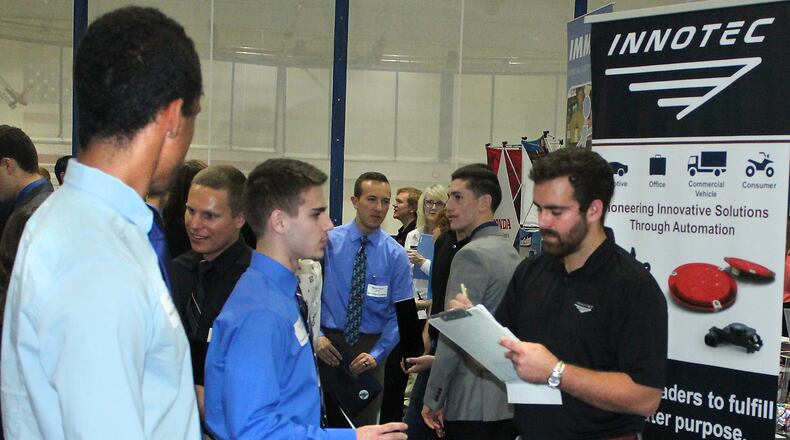Employers intend to hire 5 percent more of this spring’s class than last year’s, according to an annual survey conducted by the National Association of Colleges and Employers.
Career services administrators at area universities said they expect this year’s job placement to be near 90 percent or higher, thanks mostly to improvements in the economy since the Great Recession.
The positive job outlook means this year’s graduating class may have an easier time jump-starting their careers. It may also make up for the fact that some are considered less formal or prepared for interviews than previous generations.
“I think that might not hurt an individual as much as it did in the past,” said Jeff Reep, career services director at Cedarville University.
Around 96 percent of men and 88 percent of women believe they have are well prepared for job interviews, according to a recent survey of 401 students conducted by iCIMS, an online resource for hiring insights and trends. Employers surveyed by iCIMS said recent grads could do better when applying for a job.
Employers surveyed said 62 percent of recent grads need to become more familiar with the companies they’re interviewing at an 60 percent should ask better questions in interviews.
Area colleges take various approaches to developing the “soft skills” students are expected to have for job interviews.
Most perform mock interviews with students while some, such as Cedarville, coordinate with professors to use some class time to prepare seniors.
TWEET: Follow reporter Max Filby on Twitter for more higher ed news
“With every interview you have, you get better,” Reep said. “Why get better out there when real opportunity is slipping through your fingers. Why not get better in the dorm room or classroom.”
Grace Untener, a senior graduating from the University of Dayton on Sunday, has already secured an engineering job with FM Global in Cleveland. Untener knew what to do when she started searching for a job last fall because she already had several co-ops during her time in college.
“I’ve been interviewing for jobs since I was a freshman,” she said. “So when it came time to interview for the big one, the full-time job, I knew what to do.”
Generational shift
Workplaces are becoming more casual and experts said graduating seniors are embracing that.
Nearly gone are the days of sending hand-written thank-you notes or wearing full suits to interviews, but experts still recommend it. About 55 percent of employers surveyed by iCIMS said recent grads do not dress appropriately for interviews.
“The attire question is an age old issue,” said Jen Franchak, assistant vice president at Miami’s Center for Career Exploration and Success. “There’s usually some difference between generations.”
Along with the clothing criticism, 74 percent of employers said recent grads do not send a thank-you note after an interview. There’s still a debate about whether it’s better to send a physical thank-you or one via email, said Jason Eckert, director of UD’s career services.
If someone is the last person to interview for a job, email may be more timely. But, it doesn’t hurt to send them both ways, Eckert said.
“I think technology has caused people to become less formal,” Eckert said. “That being said, I don’t think anyone has ever not gotten a job because they sent too many thank-yous.”
Long-term outlook
The job outlook for college seniors has been improving every year for the last five years, according to the National Association of Colleges and Employers. Experts expect that trend to continue.
Ohio Means Jobs, one of the governor’s workforce initiatives, claims there are around 150,000 jobs available throughout the state. Around half of those jobs pay $50,000 or more, said Ryan Burgess, director of the governor’s office of workforce transformation
RELATED: UD recording record undergrad graduation
On top of that, the baby boomer generation is getting ready to retire, Burgess said.
Hiring increases for recent grads is partly due to colleges and businesses working together, Burgess said. He pointed to UD’s partnerships with General Electric and Emerson as examples.
Burgess is working with the Ohio Department of Higher Education and other state agencies to ensure job opportunities continue to increase for graduating seniors. Moving forward the construction industry, advanced manufacturing and information technology are fields being targeted for more recent grads, said Cheri Rice, vice chancellor for higher education and workforce alignment said.
“Businesses are trying to align with education,” Burgess said. “That makes for some great cross pollination when it comes to economic development.”
By the numbers
Employers are looking to hire 5 percent more new college graduates than they did in 2016. Employers have increased the percent of recent grads they’ve hired every year since 2012.
2017: 5 percent
2016: 5.2 percent
2015: 9.6 percent
2014: 8.6 percent
2013: 2.1 percent
2012: 10.2 percent
Source: National Association of Colleges and Employers.
About the Author
